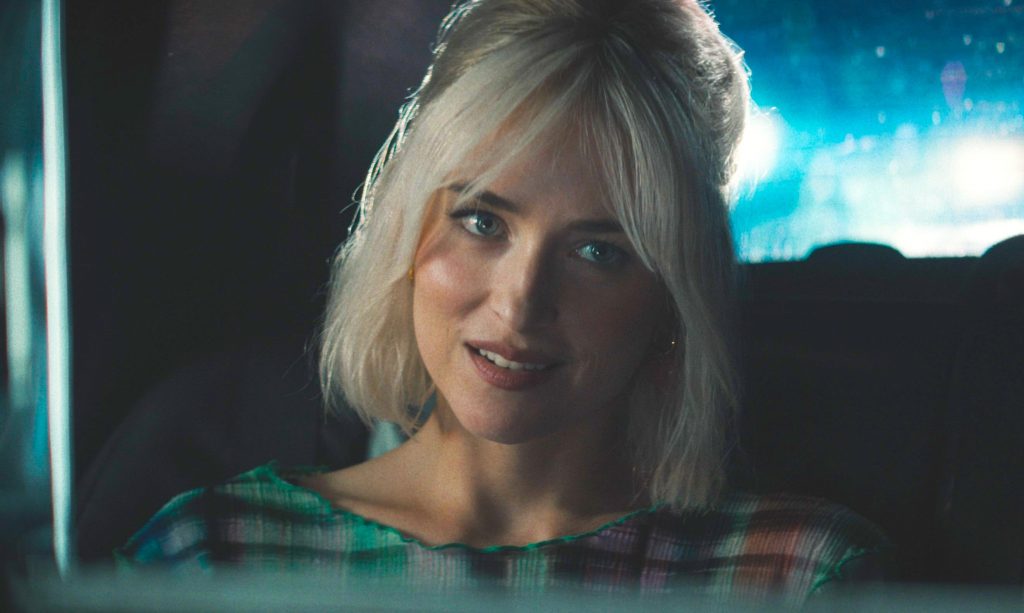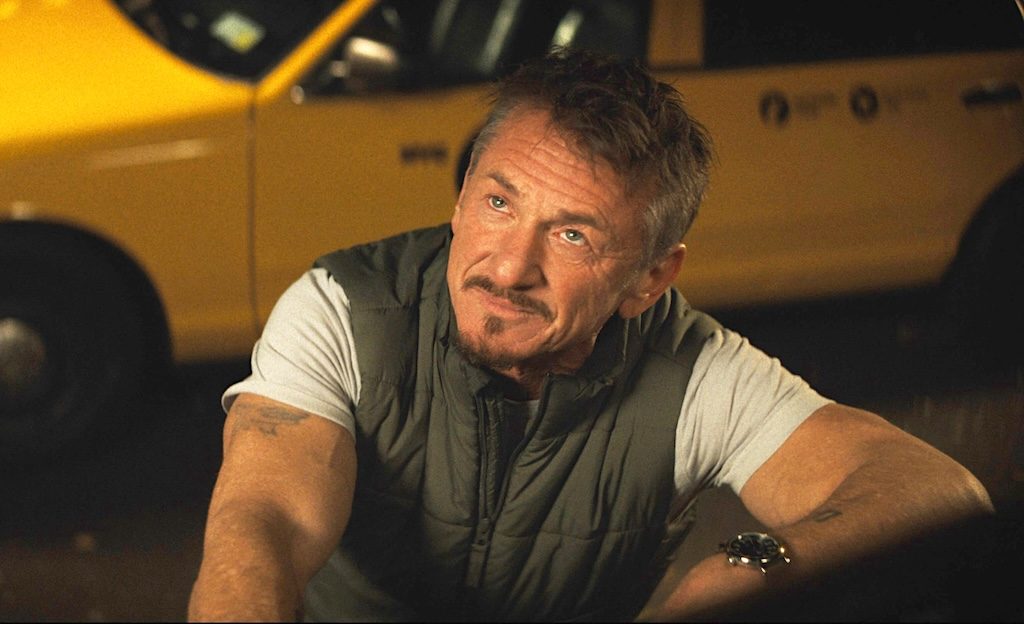Starring Sean Pean as Clark, the brash, world-weary cabbie who tells it like it is, and Dakota Johnson as the “any passenger” simply called Girlie, is a set up as a two-hander set in a cab stuck in traffic during a traffic accident. It is as raw and tender as an exposed nerve ending and as abrasive as an industrial drill. It is as claustrophobic as it is expansive.
Therein lies the warmth of Christy Hall’s film based on her unproduced play called Daddio. The title is a reference to Girlie’s affair with a family man many years her senior. Hall sets her characters up for a collision course with each other, the audience, and herself as a daring storyteller as the story unfolds.

Christy Hall. Photo by Dave Allocca / StarPix
Hall’s key intention is “to create really safe places in order to have very adult conversations about issues that many people would rather not. I’m very curious about the world and a keen observer of human behavior. It’s important as a storyteller to wonder about yourself.”
When Christy began writing Daddio in 2014 as a play, she wondered if the world was ready for such frank conversations.
“It’s my job to try to pursue the truth. If I’m wondering about these things, my job is to be brave and bold enough to decide that maybe other people are wondering about these things too.”
The Other Woman
Cinema has told countless stories about extramarital affairs, specifically about the other woman. Hall wanted to mesh this theme with “daddy issues,” hence the title. She chose to examine this idea through a lens of compassion not judgement.
“What happens when a modern woman who didn’t necessarily come from money, but has worked really hard, makes her own money, is very self-assured, highly intelligent, has a really strong sense of self, is operating in a way that she herself doesn’t even quite understand, because she’s contending with her inner child?” is more thematic fertile ground.
Girlie’s contending with things from her past that she hasn’t necessarily relinquished or healed from yet
Hall likens social morals about extramarital affairs to the echo chambers many of us live in today. Everyone forms an opinion without having all the facts. We experience “confirmation bias” and only listen to people that absolutely agree with us. If there’s a hint of decent, debate, or disagreement, friends are swiftly unfriended. “I think it’s made us a little immature as a society, if I could be so bold to say,” comments Hall.
“Daddio is also an invitation to maybe put down your phone and talk to people from a different generation or a different worldview. If we could meet each other in a place of non-judgment, I actually believe that even an imperfect stranger can change your life. That is the power of human connection.” Clark and Girlie have acknowledged they are far from perfect.
“I’m also exploring the idea of truth and illusion, the ones and zeros we all inherit by nature. It’s defined by when we were born, where we were born, what family we were born into, the conditioning that we were given as children, and then, the exploration that we have as adults going out into the world,” continues the filmmaker.
“If anyone watches this movie, I hope it inspires them to not be afraid to talk to a driver, or any stranger, and carry on a real conversation that requires real discourse where you might become challenged and uncomfortable.”
“Could you have the emotional maturity to stay in the cut and continue to engage? Life might surprise you and you might get bits of wisdom from a very unlikely source.”
Both Girlie and Clark could have shut down after the probing questions they directed at each other. They could have popped in their ear buds and blocked each other out. But they accepted the challenge of being exposed and honest instead.
“Girlie’s clearly always been kind of the fantasy girl; the dream girl and what happens when the fantasy girl actually is deciding that she might want to be more than that. I’m dissecting this film into the impossible demands that we place on women in society. A lot of times, we are compartmentalized. If you’re the dream girl, you’re only supposed to be that. We’re shoved into these boxes.” Girlie enjoyed being that girl, but her role and needs have shifted and she wants more from life.
Daddio isn’t ready to release his dream girl from his life. The audience experiences the absence of his physicality as a type of “sensory deprivation.”
Setting Up Daddio
Christy Hall originally wrote and formatted Daddio for the stage because she didn’t have any connections in the film industry. She never imagined it would see the light of day in a theater, let alone the big screen. Deep down she knew her story had mileage.
“When I first had the idea, I actually saw it in my mind’s eye as a film because of the claustrophobic nature of the cab, our ability to eavesdrop on the phone, the ability to be in his or her point of view as they discover each other,” claims Hall.
“Also that drive into Manhattan is so visceral and visual. The lights. It’s a very distinctive drive and it’s another character in the story. As we get closer to the city, we get closer to that beacon of illumination more and more as the story unfolds.”

Girlie (Dakota Johnson) Photo courtesy of Sony Pictures Classics
She continued writing plays while Daddio ruminated in uncertainty. The stageplay for Daddio eventually landed on the desk of Grandview manager Harry Lengsfield in April 2017 who ironically suggested that it might work as a screenplay. By the end of that year, Daddio became a screenplay and made the Black List.
Then things really started happening. Emma Tillinger Koskoff who produced The Irishman and Joker attached herself immediately after reading it. “In 2019 it landed in the lap of Dakota Johnson ,who not only wanted to play Girlie, but also come on as a producer. So she and Roe Donnelly, her producing partner, came onboard. From there, Dakota suggested her good friend Sean Penn play the cabbie.”
Says Penn, “Reading your script made me want to be on stage again.” Around 2020, they were able to secure financing to produce Daddio in 2022.
Writing A Contained Drama
The physical parameters of the stage indicated that Daddio should always be conceived as a contained piece. When the screenplay was circulated in the industry, Hall received some feedback to “open it up a bit” and add more locations.
Never straying too far from her original vision, Hall added some cutaways and dream-like memories of what the characters described to give it “more scope.” Since Hall was also slated to direct, producer Emma Tillinger Koskof encouraged her to fight for her vision of a contained story. “I realized that the version of the script where I have these cutaways and show visions of what Girlie’s talking about it was actually me trying to service a note, but it was never my my intention.”
So she reverted to the original screenplay as much as she could before filming began. “That’s the uniqueness and power of it. This story is ultimately celebrating the power of human connection and you need to live with both characters in the cab. You need to have that feeling of being a fly on the wall, and I feel if we cut away, even for a moment into her mind’s eye, it would leak some of the magic out or deflate the soufflé,” adds the filmmaker.

Clark (Sean Penn) Photo courtesy of Sony Pictures Classics
A film like Daddio, which is mostly set in a stationary cab, relies on its delivery to keep the forward momentum going. The relatively static nature of the environment was offset with a series of ebbs and flows and peaks and troughs of the dialogue. There are several periods of fidgety silence to allow the film to breathe and contemplate.
“I had to be extremely intentional about the chapters and the act breaks and to give it variation. At times there is a propulsion to it. There’s a pulse, there’s a banter, there’s a crackle, and then, at times, it gives way to pure unapologetic silence, which I think are the hills and valleys of regular conversation, especially with a stranger.”
The cab can represent a metaphoric confession booth or an elevator during a power outage. “That’s the point in the story where the real need of the matter comes out. It’s the only part in the story where we really are held interior. We never leave even when he gets out to go to the bathroom. We’re in Girlie’s point of view so we just we stay in the cabin.”
The delay in the journey caused by the accident “is meant to be a metaphor for all the decisions that we make that can hold us back in the moment or keep us from moving forward. I allow that section of the journey to be a little uncomfortable and a little claustrophobic because that’s when a lot of the big reveals come out.”
“I wanted to be extremely intentional about giving the audience a feeling that we were still moving forward; the feeling of chapters. We see Manhattan played before us that to give it a pulse and a presence and a thoughtful roadmap.”
Although far from being a two hour movie, Daddio packs an entire relationship in a hundred minutes – from meeting to breaking up. “I want to make sure that Clark and Girlie are living with each other just long enough that we could dare to believe that where they end up would feel honest. If you rush too much, it would feel a little contrived and forced. It’s an easy uneasiness.”
The relationship between Clark and Girlie blossoms in carefully calibrated dialogue exchanges. Each takes turns at holding the dialogue ball. Much of this due to Hall’s background as a playwright.
“Playwrights do tend to allow their characters to talk to each other. You’re a stenographer in the corner listening to them.”
Much of the “loosening of secrets” between Clark and Girlie were “discovered on the page.” Both were in a particular emotional state and needed someone to open up to. The opportunity presented itself. There’s also something about opening up to a complete stranger you know you probably won’t ever see again.
In such narratives, the Stranger is typically not given a name, doesn’t offer hard advice, and actively listens. Clark defies these tropes in Daddio and often speaks harsh truths.
Daddio, the family man, is an integral third character in the Daddio triangle, yet we only hear and see him on Girlie’s phone.
“A lot of the thematics of this story are the secrets that we keep, particularly those locked away in our phones. I liked the idea that the audience could eavesdrop on that. Sometimes it’s easier to engage with someone in a certain way by way of technology because there are the different versions of ourselves in different situations.”
Clark and Girlie reach the end of a long and depleting emotional journey in Manhattan. There’s elation and heartbreak because it’s the end of the road for them.
“They’re both deeply surprised by what has just unfolded. They are emotionally exhausted, but also, they are maybe for the first time in a long time, feel a little less alone. They’re still relishing the power of human connection the profound thing that can happen with another person.” There’s also the bittersweet moment of disconnection after the completion of a long journey.
Their goals of better understanding themselves has been achieved. Their emotional strait jackets have loosened.
